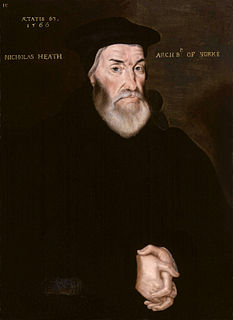Related Research Articles

Edmund Bonner was Bishop of London from 1539–49 and again from 1553-59.

Nicholas Heath was the last Catholic archbishop of York and Lord Chancellor.
Thomas Thirlby, was the first and only bishop of Westminster (1540–50), and afterwards successively bishop of Norwich (1550–54) and bishop of Ely (1554–59). While he acquiesced in the Henrician schism, with its rejection in principle of the Roman papacy, he remained otherwise loyal to the doctrine of the Roman Catholic Church during the English Reformation.
Owen Oglethorpe was an English academic and Roman Catholic Bishop of Carlisle, 1557–1559.

The Roman Catholic Archdiocese of Birmingham is one of the principal Latin-rite Catholic administrative divisions of England and Wales in the hierarchy of the Roman Catholic Church. The archdiocese covers an area of 3,373 square miles (8,740 km2), encompassing Staffordshire, the West Midlands, Warwickshire, Worcestershire and much of Oxfordshire as well as Caversham in Berkshire. The metropolitan see is in the City of Birmingham at the Metropolitan Cathedral Church of Saint Chad. The metropolitan province includes the suffragan dioceses of Clifton and Shrewsbury.
Hugh Curwen was an English ecclesiastic and statesman, who served as Archbishop of Dublin and Lord Chancellor of Ireland from 1555 to 1567, then as Bishop of Oxford until his death in November 1568.
Thomas Young (1507–1568) was a Bishop of St David's and Archbishop of York (1561–1568).

Universalis Ecclesiae was a papal bull of 29 September 1850 by which Pope Pius IX recreated the Roman Catholic diocesan hierarchy in England, which had been extinguished with the death of the last Marian bishop in the reign of Elizabeth I. New names were given to the dioceses, as the old ones were in use by the Church of England. The bull aroused considerable anti-Catholic feeling among English Protestants.
Richard Sampson was an English clergyman and composer of sacred music, who was Anglican bishop of Chichester and subsequently of Coventry and Lichfield.
Gilbert Bourne was the last Roman Catholic Bishop of Bath and Wells, England.
Henry Cole was an English Roman Catholic churchman and academic.

William Downham, otherwise known as William Downman, was Bishop of Chester early in the reign of Elizabeth I, having previously served as her domestic chaplain.
John Boxall was an English churchman and secretary of state to Mary I of England.
Richard Cheyney was an English churchman, bishop of Gloucester from 1562. Opposed to Calvinism, he was an isolated and embattled bishop of the reign of Elizabeth, though able to keep his see.
William Chedsey (1510?-1574?) was an English Roman Catholic and academic, archdeacon of Middlesex in 1556 and President of Corpus Christi College, Oxford in 1558.
Thomas Yale (1525/6–1577) was an English civil lawyer.
Humphrey Fenn, was an English puritan divine.
Michael Geoffrey Ipgrave, is a British Anglican bishop. Since 2016, he has been the Bishop of Lichfield, the diocesan bishop of the Diocese of Lichfield. He was the Bishop of Woolwich, an area bishop in the Diocese of Southwark, from 2012 to 2016. He served as Archdeacon of Southwark between 2004 and 2012.
The Bishop of Chester is the Ordinary of the Church of England Diocese of Chester in the Province of York.
Edmund Steward otherwise Stewart or Stewarde was an English lawyer and clergyman who served as Chancellor and later Dean of Winchester Cathedral until his removal in 1559.
References
-
 This article incorporates text from a publication now in the public domain : "Pole, David". Dictionary of National Biography . London: Smith, Elder & Co. 1885–1900.
This article incorporates text from a publication now in the public domain : "Pole, David". Dictionary of National Biography . London: Smith, Elder & Co. 1885–1900.
| Church of England titles | ||
|---|---|---|
| Preceded by John Chambers | Bishop of Peterborough 1557–1559 | Succeeded by Edmund Scambler |